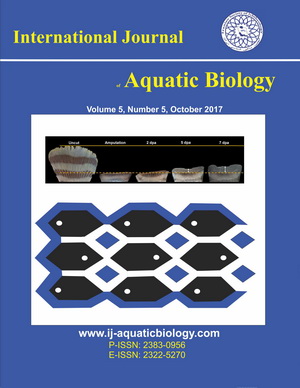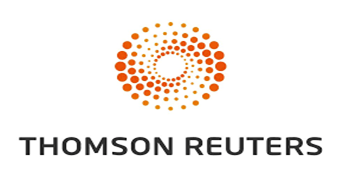About the Journal
Focus and Scope
Scopes of the International Journal of Aquatic Biology include:
Biology, ecology, physiology, biochemistry, and genetics of all aquatic organisms under laboratory and field conditions.
- Freshwater and marine biology, including life history, evolution, biodiversity, biogeography, population genetics, invasive species, taxonomy
- Ichthyology (morphology, taxonomy and new description of fish species, biogeography, biodiversity, conservation, ecology and general biology of fishes)
- Limnology
- Oceanography
- Stock assessment and population dynamics
- Ecotoxicology
- Aquatic environmental management, protection and conservation of living aquatic resources
- Aquatic ecology
- Aquaculture
Peer Review Process
The submitted articles will be peer-reviewed with three anonymous referees. Authors are encouraged to suggest three potential reviewers, however, the editorial board of IJAB has the right to accept or reject the suggested referees. The accepted articles may be subjected to further editing by the journal editorial staff before online publishing.
Open Access Policy
This journal provides immediate open access to its content on the principle that making research freely available to the public supports a greater global exchange of knowledge.
Publication Ethics and Malpractice Statement
International Journal of Aquatic Biology (IJAB) is committed to ensuring ethics in publication and quality of articles. The editorial board of IJAB is responsible for preventing publication malpractices. Unethical behavior is unacceptable and plagiarism is not tolerated in any form. Authors, reviewers and editors are to be fully committed to good publication practice and take charge for fulfilling the following responsibilities.
Publication and authorship
- All submitted manuscripts are subject to single blind peer-review process by at least two international reviewers that are experts in the subject matter of the submitted manuscript. The factors that consider in review are relevance, significance, originality, readability and language.
- Authors can suggest five potential reviewers - experts in the subject matter of the article - but the editorial board of IJAB can accept or reject suggested referees.
- The accepted articles may subject to further editing by journal editorial staff before they appear in print.
- The possible decisions include acceptance, acceptance with revisions, or rejection based on reviewers comments or editorial board decision. If authors are encouraged to revise and resubmit a manuscript, there is no guarantee that the revised submission will be accepted. Rejected manuscripts will not be considered for further reviewing process.
- IJAB is committed to complete reviewing process, if there is no response from any requested potential reviews. The editorial board can assign the manuscript to section editor to make final decision or reject the manuscript.
- Review articles should also be objective, comprehensive, and accurate.
- No research can be included in more than one publication.
Authors' responsibilities
- Authors should certify that their manuscripts are their original work and not previously been published elsewhere and not currently being considered for publication elsewhere.
- If the authors have used the work and/or words of others, that should be appropriately cited or quoted.
- Authors are obliged to provide accurate account of the work performed as well as an objective discussion of its significance.
- Authors must provide corrections of mistakes.
- All Authors mentioned in the paper must have significantly contributed to the conception, design, execution, or interpretation of the reported study.
- Authors must state that all data in the paper are real and authentic.
- Authors must notify the Editors of any conflicts of interest.
- Authors must identify all sources used in the creation of their manuscript. A paper should contain sufficient detail and references to permit others to replicate the work. Fraudulent inaccurate statements constitute unethical behavior are unacceptable.
- Authors must notify the journal editor of any errors or inaccuracy in their published work, when they discover in their published paper.
- When an author discovers a significant error or inaccuracy in his/her own published work, it is the author's obligation to promptly notify the journal editor or publisher and cooperate with the editor to retract or correct the paper.
- Authors are asked to provide the raw data in connection with a paper for editorial review, and should be prepared to provide public access as well.
- Acknowledgment of the work of others must be given. Authors should cite publications that have been influential in determining the nature of the reported work.
Reviewers' responsibilities
- Reviewers should keep all information regarding manuscript confidential and treat them as privileged information.
- Reviews should be conducted objectively, with no personal criticism of the author.
- Reviewers should express their views clearly with supporting arguments.
- Reviewers should identify relevant published work that has not been cited by the authors.
- Reviewers should also call to the Editor-in-Chief or Managing editor's attention any substantial similarity or overlap between the manuscript under consideration and any other published paper of which they have personal knowledge.
- Reviewers should not review manuscripts in which they have conflicts of interest resulting from competitive, collaborative, or other relationships or connections with any of the authors, companies, or institutions connected to the papers.
Editors' responsibilities
- Editors have complete responsibility and authority to reject/accept a submitted manuscript.
- Editors are responsible for the contents and overall quality of the publication.
- Editors should guarantee the quality of the papers and the integrity of the academic record.
- Editors should have a clear picture of a research's funding sources.
- Editors should base their decisions solely one the papers' importance, originality, clarity and relevance to publication's scope.
- Editors should not reverse their decisions nor overturn the ones of previous editors without serious reason.
- Editors should preserve the anonymity of reviewers.
- Editors should ensure that all research material they publish conforms to internationally accepted ethical guidelines.
- Editors should act if they suspect misconduct, whether a paper is published or unpublished, and make all reasonable attempts to persist in obtaining a resolution to the problem.
- Editors should not allow any conflicts of interest between staff, authors, reviewers and board members.
- Editor and any editorial staff must not disclose any information about a submitted manuscript to anyone other than the corresponding author, reviewers, potential reviewers, other editorial advisers, and the publisher, as appropriate.
Journal License
International Journal of Aquatic Biology is the copyright holders of published articles. IJAb will license the articles under a Creative Commons Attribution License that allows others to share the work with an acknowledgement of the work's authorship and initial publication in this journal.
Authors are permitted to post their work online (e.g., in institutional repositories or on their website), as it can lead to productive exchanges, as well as earlier and greater citation of published work (See The Effect of Open Access).
Duties of the Editorial Team
Editor-in-chief:
The Editor-in-Chief (EIC) has the responsibility to set the journal scope and ensures the manuscript review process follows IJAB guidelines. The EIC makes the final decision on acceptance or rejection of submissions after they have passed through the review process. In addition, the EIC is responsible for the promotion of the journal.
The Director of Journal submits a recommendation to the Board of Iranian Society of Ichthyology for appointing the EIC. The EIC is appointed by the Board of Iranian Society of Ichthyology. The Editor-in-Chief term is three years.
Managing editor: Coordinates the workflow of the Journal
a. To check that the submitted manuscript is in the scopes of Journal.
b. To check that the submitted manuscript is prepared according the guideline of journal.
c. An initial screening of the submitted manuscripts to judge its basic suitability based on the journal policy. (The acceptance rate for the IJAB During 2013-2014) is around 23% to 27%, so it is reasonable that as many as 50% of papers will be rejected at the screening stage)
d. Assigning the submitted manuscript to related editors.
e. Holding regular board meetings.
Editor: Review assigned manuscript in a specific area
a. Judgment about suitability of manuscript based on following criteria:
- Quality of writing and clarity of presentation: If a paper is poorly written or unclear, it is unsuitable for detailed review and it should be rejected on these grounds alone. There is no need for you to judge its scientific content.
- Interest to potential readers: We expect papers to make an interesting contribution; there is inevitably an element of subjectivity in judging the interest of a paper, and we are confident that our Associate Editors have the ability to do this.
- Novelty and originality: If a paper clearly does not make a reasonable original contribution then it should be rejected at this stage
b. The initial screening should be finished within two weeks of receipt of the manuscript. If you judge that the paper is not suitable for further consideration, please recommend rejection including some comments to the managing editor
c. If you judge the paper passes the initial screening, then move to the review stage. In this stage, the manuscript should be reviewed by at least two or more referees (Two positive or negative would be enough for final decision). You can be one referee, if you wish and send the manuscript to other reviewers.
d. The review stage should be completed in one months. The reviewers should look in closer detail at the interest and originality of the paper. We must do our best to ensure that published papers are technically correct.
e. Each editors will be expected to receive 2-5 papers per month.
Associate editor: Its job is as same as editor. Since, the journal has some limitation in the number of editors. The associate editor is appointed in specialty areas fall within the scope of the Journal. The number of AE's and their specialty areas are decided by the Editor-in-Chief with assistance of Director.
Advisory board member: The Advisory board provides guidance to the Editor-in-Chief and Managing editor on issues regarding the direction of the journal and producing a relevant and high-quality publication. The AB also serves in the role of Appeal Board in problematic review cases. The AB member is appointed by Editor-in-Chief.








